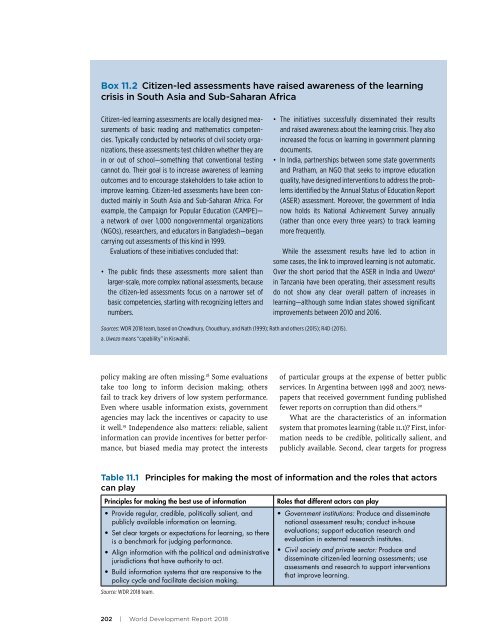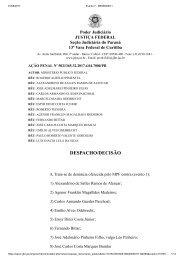Brasil só deve dominar Leitura em 260 anos, aponta estudo do Banco Mundial Relatorio Banco Mundial _Learning
Create successful ePaper yourself
Turn your PDF publications into a flip-book with our unique Google optimized e-Paper software.
Box 11.2 Citizen-led assessments have raised awareness of the learning<br />
crisis in South Asia and Sub-Saharan Africa<br />
Citizen-led learning assessments are locally designed measur<strong>em</strong>ents<br />
of basic reading and math<strong>em</strong>atics competencies.<br />
Typically conducted by networks of civil society organizations,<br />
these assessments test children whether they are<br />
in or out of school—something that conventional testing<br />
cannot <strong>do</strong>. Their goal is to increase awareness of learning<br />
outcomes and to encourage stakeholders to take action to<br />
improve learning. Citizen-led assessments have been conducted<br />
mainly in South Asia and Sub-Saharan Africa. For<br />
example, the Campaign for Popular Education (CAMPE)—<br />
a network of over 1,000 nongovernmental organizations<br />
(NGOs), researchers, and educators in Bangladesh—began<br />
carrying out assessments of this kind in 1999.<br />
Evaluations of these initiatives concluded that:<br />
• The public finds these assessments more salient than<br />
larger-scale, more complex national assessments, because<br />
the citizen-led assessments focus on a narrower set of<br />
basic competencies, starting with recognizing letters and<br />
numbers.<br />
• The initiatives successfully diss<strong>em</strong>inated their results<br />
and raised awareness about the learning crisis. They also<br />
increased the focus on learning in government planning<br />
<strong>do</strong>cuments.<br />
• In India, partnerships between some state governments<br />
and Pratham, an NGO that seeks to improve education<br />
quality, have designed interventions to address the probl<strong>em</strong>s<br />
identified by the Annual Status of Education Report<br />
(ASER) assessment. Moreover, the government of India<br />
now holds its National Achiev<strong>em</strong>ent Survey annually<br />
(rather than once every three years) to track learning<br />
more frequently.<br />
While the assessment results have led to action in<br />
some cases, the link to improved learning is not automatic.<br />
Over the short period that the ASER in India and Uwezo a<br />
in Tanzania have been operating, their assessment results<br />
<strong>do</strong> not show any clear overall pattern of increases in<br />
learning—although some Indian states showed significant<br />
improv<strong>em</strong>ents between 2010 and 2016.<br />
Sources: WDR 2018 team, based on Chowdhury, Choudhury, and Nath (1999); Rath and others (2015); R4D (2015).<br />
a. Uwezo means “capability” in Kiswahili.<br />
policy making are often missing. 18 Some evaluations<br />
take too long to inform decision making; others<br />
fail to track key drivers of low syst<strong>em</strong> performance.<br />
Even where usable information exists, government<br />
agencies may lack the incentives or capacity to use<br />
it well. 19 Independence also matters: reliable, salient<br />
information can provide incentives for better performance,<br />
but biased media may protect the interests<br />
of particular groups at the expense of better public<br />
services. In Argentina between 1998 and 2007, newspapers<br />
that received government funding published<br />
fewer reports on corruption than did others. 20<br />
What are the characteristics of an information<br />
syst<strong>em</strong> that promotes learning (table 11.1)? First, information<br />
needs to be credible, politically salient, and<br />
publicly available. Second, clear targets for progress<br />
Table 11.1 Principles for making the most of information and the roles that actors<br />
can play<br />
Principles for making the best use of information<br />
• Provide regular, credible, politically salient, and<br />
publicly available information on learning.<br />
• Set clear targets or expectations for learning, so there<br />
is a benchmark for judging performance.<br />
• Align information with the political and administrative<br />
jurisdictions that have authority to act.<br />
• Build information syst<strong>em</strong>s that are responsive to the<br />
policy cycle and facilitate decision making.<br />
Source: WDR 2018 team.<br />
Roles that different actors can play<br />
• Government institutions: Produce and diss<strong>em</strong>inate<br />
national assessment results; conduct in-house<br />
evaluations; support education research and<br />
evaluation in external research institutes.<br />
• Civil society and private sector: Produce and<br />
diss<strong>em</strong>inate citizen-led learning assessments; use<br />
assessments and research to support interventions<br />
that improve learning.<br />
202 | World Development Report 2018








